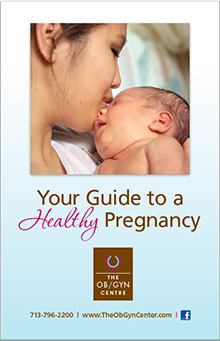Prenatal Care
Postpartum Instructions
- Make an appointment to see the doctor for a check-up 6 weeks after vaginal delivery, 2 weeks after cesarean for an incision check and then at 6 weeks postpartum.
- Refrain from douching, tampons and swimming until after your post-partum check-up.
- You may ride in a car but no driving for about 2 weeks.
- If breastfeeding, continue your prenatal vitamins daily, eat a well balanced diet, and increase your fluid intake to 10-12 glasses of water per day. With any signs or symptoms of a breast infection (fever, flu-like symptoms, pain or redness in the breast) call the office for further instructions.
- If not breastfeeding, continue to wear a good supportive bra, bind if necessary, use ice packs, take Tylenol® for discomfort, and call the office if the problem persists or worsens.
- Vaginal bleeding may continue for 6-8 weeks while the uterus is involuting back to pre-pregnancy state. You may have spotting and/or menstrual-like flow. Increased activity increases the flow. If bleeding or cramping increases to greater than a period, take two Advil and get off your feet. If bleeding is persistently heavy, call the office for further instructions.
- Avoid lifting anything heavier than your baby until after your post-partum check-up.
- Exercise – Avoid sit-ups, jumping jacks and aerobics until after your post-partum check-up. You may do simple abdominal tightening exercises, kegal exercises, and walking.
- Constipation is very common. Drink 6-8 glasses of liquids every day. Citrucel, Metamucil, and stool softeners (Colace) may be used. Include food like bran cereal, fresh fruits and vegetables in your diet. Stool softeners are recommended while taking Percocet or Vicodin.
- Hemorrhoids usually are more symptomatic after delivery. If they are a problem for you, we can prescribe medication to relieve symptoms.
- Post-partum blues – Sadness, crying and blues are normal responses to hormonal changes in your body after the baby is born. Please let us know if you need additional assistance or if you are concerned that the blues have turned into depression.
- Abstain from intercourse for 2-3 weeks or longer if your stitches are still painful. Contraception options may need to be discussed with your doctor at your check-up or earlier if you have special needs.
- You may climb stairs 2-3 times a day in the first 2 weeks. Too much activity delays episiotomy and incisional healing.
- Please call the office if you have a fever of 101ºF or greater, swelling, tenderness or redness in the lower leg.
- If you had a Cesarean delivery, keep your incision clean with soap and water. Bandage with gauze only if instructed. Call the office if the incision is swollen, red or has any unusual drainage. Remove any steristrips after 10 days.
- Tub bathing and showering are permitted.
Postpartum Depression
40-80% of women experience mood changes after their delivery. This most commonly starts 2-3 days after delivery and usually goes away by 2 weeks. It is important to eat properly, get adequate sleep and reduce stress during this time to help with the symptoms. Sometimes the symptoms require treatment especially if mom is not bonding or enjoying her baby; unable to care for herself or the baby; feeling excessive sadness, depression or anxiety. Please schedule an appointment if you feel a problem is occurring. We are known for our compassionate care and have effective treatments for postpartum depression.
Affiliations
Meet the Staff
Testimonials
Forms
Make an Appointment
See Test Results
Copyright©2016 The OB/GYN Centre. All rights reserved.

